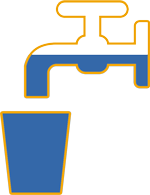Core Values
❖ We strive to be welcoming and collaborative. We believe a multiplicity of perspectives and experiences is beneficial to a healthy and effective workplace, and requires equitable participation of all team members. This diversity is necessary to achieve our organization’s goals for creating access to equitable sanitation systems and maintaining healthy functioning ecosystems.
❖ We are curious. We value different ways of knowing, communicating, and understanding. We recognize the limits of our personal experiences and knowledge, and commit to the process of understanding how these limits influence our thoughts and our actions.
❖ We care deeply about the natural environment. We have a passionate belief that we have a role to play in environmental stewardship. We recognize that resiliency and stewardship must reinforce the livelihoods of all living things, including our own species.
❖ We value transparency. We commit to direct communication and accountability in our decision making. We recognize that individuals respond to different forms of information and have different entry points, and we strive to make our work accessible to all people.
❖ We act locally. While we recognize the global importance of our work, we began and remain grounded as a community-scale project. We strive to be a model for all communities as our food and agricultural, energy, water and waste management systems evolve.
❖ We strive to advance global food and water sovereignty movements. Our work conserves potable water supplies, protects water quality, and produces low-cost fertilizer. We strive to connect the dots between this reclaimed abundance and the communities that have been denied access through systems of injustice.
Group Norms
This is how our core values translate into how we communicate with each other, our partners, and the public at large.
❖ We commit to thoughtfully considering the issues before us, including how our core values impact our decisions.
❖ We agree to learn from each other, to create an accommodating environment, and to proactively address any barriers to access and participation.
❖ We acknowledge that power and privilege affect our communication and decision making processes. We rely on each other to acknowledge and consistently counteract those impacts so that our process and decisions are as inclusive as possible.
❖ We agree to come to all discussions with an open mind and without hidden agendas. When we disagree we strive to always assume the best intentions of each other.
❖ We agree to ask questions and respond to questions in a respectful way.
❖ We agree to listen to each other attentively, and to use electronic devices during meetings only to support our participation.
Our History of Thinking & Intentions for Social Justice
Part of the original impetus to found Rich Earth in 2012 was to see what a dedicated team in rural Vermont could do to support the emerging global movement focused on rethinking sanitation systems. Our work began to take aim at addressing urgent needs for better waste management solutions. From there, the Rich Earth team has gone on to explore how peecycling can contribute to sanitation justice, as well as advancing practices for food, water, and environmental justice in communities outside of rural Vermont.
We aim to put what we’ve learned about circular sanitation and resource recovery into conversation with other communities, supporting different groups on their own journeys towards reclaiming the abundance that our bodies produce. We are working to create new worlds within the seams of the old, reclaiming as a resource something that has been cast off as a “waste” and a source of pollution. We see this work in solidarity with other movements that demonstrate what new worlds of hope, joy, and justice can be possible, even amidst systems of oppression and white supremacy.
Early in Rich Earth’s operation, our staff and board collaboratively created a series of core values and group norms to guide our operations, to be revisited and updated as needed. In 2017, we revised these core values to reflect how our work is situated within the broader environmental movement. We also incorporated our values for ethical sourcing, accessible technologies and commitment to local action whilst supporting, nurturing and learning from global movements.
Since then, our team has been engaging in ongoing discussions about strategies for structurally orienting our work to further racial and economic justice and support interconnected movements.
Our discussions have revolved around some core questions such as: Given the particular niche of our organization, where does our responsibility lie for justice-centered work? Where can we direct our work to have the greatest impact? How does this orientation impact our strategy going forwards – i.e. which research questions we prioritize, what education strategies we employ, and how we engage our local community?
As an historically white-majority organization, we recognize that we have a lot of learning to do and we are ready to learn from any mistakes we make along the way. We strive to take a collaborative approach to our projects, learning how we can offer our tools and resources to partner with diverse communities according to their wants and needs.
In 2023, the Rich Earth staff and board formulated a new three-year strategic plan, which integrates our renewed thinking on these topics into our organizational strategy for intersectional movement-building. Excerpts from this plan are outlined under our Vision.

